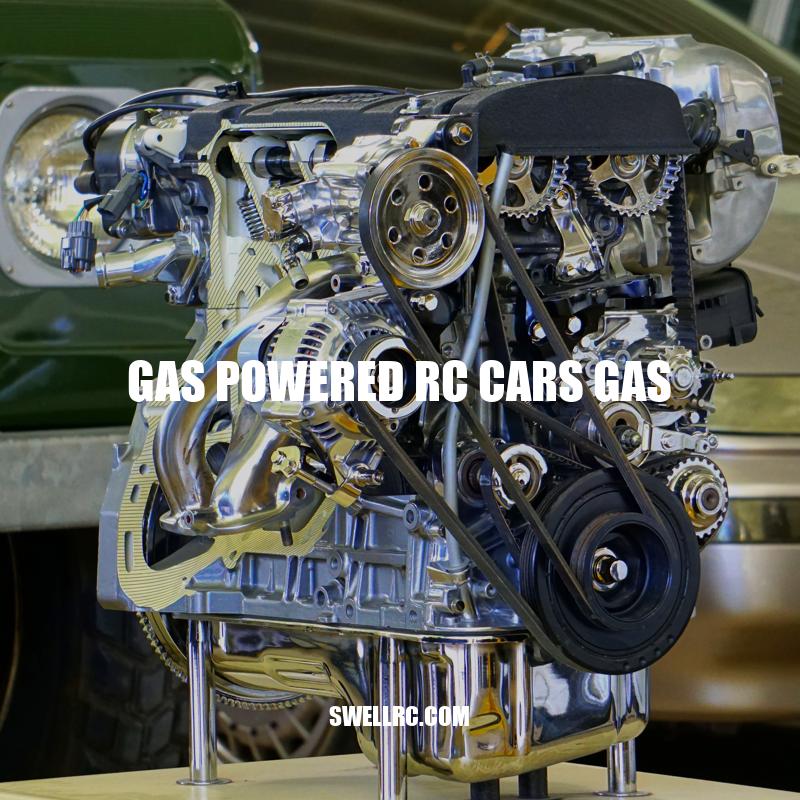Gas-Powered RC Cars: A Guide to Choosing, Maintaining, and Enjoying Your Vehicle
Gas-Powered RC Cars: An Introduction
Remote-controlled cars have been a popular toy for children for many years now. However, with the rise of more advanced technology, remote-controlled cars have evolved to become more complex and intricate. One particular type of remote-controlled car that has become more and more popular to hobbyists and collectors alike are gas-powered RC cars. These cars are unique in that they use a small engine fueled by a mixture of gasoline and oil to power them. This results in a more realistic driving experience that’s far more engaging than electric RC cars. Furthermore, unlike electric-powered models which need a recharge after a certain amount of run-time, gas-powered RC cars can be refuelled with gasoline and oil and continue to run for longer periods. In this article, we’ll take an in-depth look at gas-powered RC cars, the pros and cons of owning one, things to consider when purchasing, as well as how you can get the most out of your new toy.
The Pros and Cons of Gas-Powered RC Cars
As with any product, there are pros and cons to owning a gas-powered RC car. Here are some of the things to consider:
- Pros:
- Longer Run Times: Gas-powered RC cars can run for longer periods without the need for recharge, meaning you’ll be able to enjoy your hobby for longer periods without interruption.
- Faster Speeds: Gas engines are often faster than electric ones, and allow for greater control, providing a more realistic driving experience.
- Realistic Sound and Scent: Because gas-powered RC cars operate with a miniature combustion engine, they make a more realistic engine sound than electric ones and even produce the scent of gasoline and oil.
- Cons:
- Higher Cost: Gas-powered RC cars tend to be more expensive than their electric counterparts. To add to that the fuel for the cars, which is generally a mixture of gasoline and oil, is also a recurring cost.
- More Maintenance Requirements: Gas engines require more maintenance than electric motors, and this will include regular oil changes, spark plug inspections, and cleaning, which might be expensive because of the specialized tools required.
- Noise and Pollution Concerns: Because gas-powered RC cars run with an actual combustion engine that uses fuel, they do generate exhaust fumes, which might result in noise or pollution if driven in enclosed environments such as public parks or residential areas.
If you’re considering purchasing a gas-powered RC car, it’s important to weigh these factors against each other to determine whether this type of vehicle is right for you. In the next section, we’ll provide some tips on what to look for when shopping for a gas-powered RC car.
How does a gas powered RC car work?
A gas powered RC car works by using a small 2-stroke engine to turn the wheels rather than an electric motor. The engine runs on a mixture of fuel and oil, and the throttle is controlled by a servo. The radio transmitter sends signals to the receiver, which in turn controls the speed and direction of the car. Some popular gas powered RC car brands are HPI Racing and Traxxas.
For more information on gas powered RC cars, you can check out websites such as Horizon Hobby and RC Universe. They offer a wide range of gas powered RC cars, as well as parts and accessories for repairs and upgrades.
Choosing a Gas-Powered RC Car
When choosing a gas-powered RC car, there are a few things to consider. Here are some tips to help you make the right choice:
- Skill Level: Some gas-powered RC cars may require more advanced driving skills than others. It is important to choose a car that aligns with your skill level and experience.
- Terrain: Gas-powered RC cars may perform better on certain types of terrain. It is helpful to consider the type of terrain you will be driving on when choosing a car.
- Budget: Gas-powered RC cars are often more expensive than electric ones, so it is important to establish your budget before you begin shopping. It is advisable to determine your budget before purchasing the car and to research the market for available models that match your budget.
- Brand: A reliable brand can ensure the longevity and performance of your gas-powered RC car. Look for brands with a reputation for producing quality products.
Keep in mind that different models of gas-powered RC cars may have varying features and capabilities. It is important to conduct thorough research before making a purchase. There are various online stores that stock these cars, and some websites offer detailed reviews and specifications tables for different models. There are top brands such as Losi, HPI Racing, Traxxas and Redcat Racing that offer great gas-powered RC cars.
| Brand | Model | Price |
|---|---|---|
| Losi | LST XXL 2 Gas Monster Truck | $1,300 |
| HPI Racing | Baja 5B SS Kit | $1,400 |
| Traxxas | Jato 3.3 Nitro-Powered Stadium Truck | $560 |
| Redcat Racing | Tornado S30 Nitro Buggy | $220 |
How to choose a RC car?
When choosing an RC car, there are a few factors to consider:
- Type: There are various types of RC cars, such as on-road, off-road, drift, crawler, and more. Choose one that suits your preferences.
- Scale: Consider the size of the car you want, with options ranging from small 1/28 scale up to large 1/5 scale.
- Power source: Decide between electric or gas-powered models, each with their own advantages and disadvantages.
- Price: RC cars can range from budget-friendly to thousands of dollars. Determine your budget before making a purchase.
- Brand and quality: Look for reliable and reputable brands with positive reviews to ensure your car will last.
Some great websites for researching and purchasing RC cars include hobbytron.com, amainhobbies.com, and towerhobbies.com. These sites offer a wide selection of top-quality RC cars for all types of enthusiasts.
Maintaining Your Gas-Powered RC Car
Maintaining your gas-powered RC car is crucial in keeping it running smoothly and performing at its best. Here are some tips on how to maintain your car:
- Cleaning: After every use, clean your car to remove any debris or dirt that may have collected on the car’s body or wheels.
- Oil Change: Just like real cars, gas-powered RC cars require oil changes to keep the engine lubricated and running smoothly. Consult the manufacturer’s manual for the recommended oil change frequency.
- Spark Plug Replacement: Spark plugs should be checked regularly, and replaced when necessary.
- Storage: When not in use, store your car in a dry and cool place. It is advisable to disconnect the battery and fuel tank to prevent corrosion and leakage.
- Safety: Always practice safety when handling gas-powered RC cars. Do not operate them indoors or near flammable liquid. Wear protective gear, such as gloves and safety goggles.
If you notice issues like overheating, engine flooding, or decreased performance, consult the manufacturer’s manual or contact a repair specialist for assistance. There are various online tutorials on how to maintain gas-powered RC cars, and some websites offer spare parts and repair services.
There are many brands of gas-powered RC cars, such as Traxxas, HPI Racing, and Redcat Racing. These brands offer a variety of models with different features and specifications to meet the needs of different enthusiasts. To keep your gas-powered RC car running efficiently and safely, it is important to follow the manufacturer’s instructions for maintenance and operation.
In summary, taking care of your gas-powered RC car is crucial in keeping it running smoothly and performing at its best. Regular cleaning and maintenance, including oil changes, spark plug replacement, and safe storage practices, can help ensure the longevity of your car. Keeping up with these practices will allow you to enjoy your gas-powered RC car to the fullest.
What is the maintenance of RC cars?
Maintaining RC cars can prolong their lifespan and improve their performance. Some basic maintenance tips include:
- Inspecting the car thoroughly after each use to check for any damages or loose parts that may need to be fixed or tightened
- Cleaning the car and removing any debris or dirt that may have accumulated after use
- Lubricating the parts that require it, such as the gears and suspension system
- Replacing worn out parts, such as the tires or batteries, to ensure optimal performance
For more detailed information and tips on RC car maintenance, websites like RC Driver and RC Geeks offer helpful guides and product recommendations for both novice and experienced RC car enthusiasts. Additionally, purchasing high-quality products from reputable brands like Traxxas and Axial can also contribute to the longevity and overall performance of RC cars.
| Website | Description |
|---|---|
| RC Driver | A website offering comprehensive guides on RC car maintenance, as well as product reviews and news updates on the latest RC cars and accessories. |
| RC Geeks | An online retailer specializing in high-quality RC cars and accessories, with a blog section featuring helpful tips and guides on maintenance, repairs, and upgrades. |
Getting the Most Out of Your Gas-Powered RC Car
Owning a gas-powered RC car can be an exciting and fun hobby. However, there are a few things you can do to ensure that you get the best possible experience out of your vehicle. By following the tips outlined below, you can maximize your car’s performance and longevity:
Upgrade your car’s parts: Upgrading your car’s components, such as the wheels, suspension, or engine, can significantly improve its performance and make it more fun to drive. Be sure to select parts that are compatible with your car’s existing setup.
Customize your car’s appearance: Personalizing your car’s appearance with decals, paint, or custom bodywork can make it stand out and reflect your unique style.
Join a club or online community: Joining a local RC club or online community can be an excellent way to connect with other hobbyists and learn more about gas-powered RC cars. You can get advice on upgrades, maintenance, and driving tips.
Attend RC racing events: Attending races or competitions can be a great way to experience the joy and excitement of racing your car against others. You can also learn tips and tricks from experienced drivers and network with other hobbyists.
In conclusion, owning and maintaining a gas-powered RC car can be an enjoyable and rewarding hobby. By following the tips outlined above, you can get the most out of your car and join a community of passionate and dedicated RC enthusiasts.



